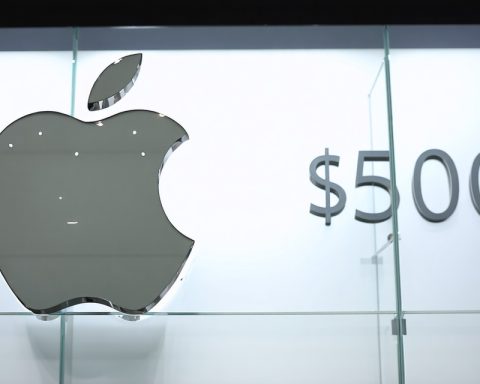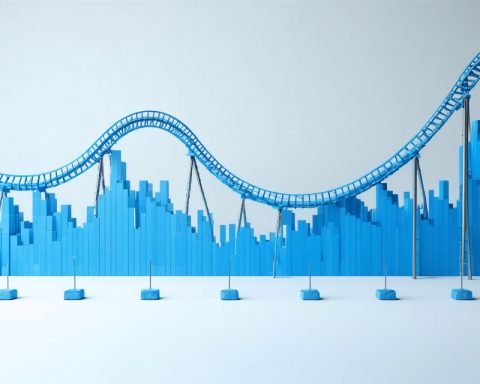- Retail sales experienced a 0.9% decline in January, indicating potential challenges for economic growth.
- Sectors such as music and sporting goods saw sharp decreases, while gas stations showed resilience with steady growth.
- Arko Corp. focuses on strategic shifts to strengthen its position, converting retail stores to dealer sites amid economic headwinds.
- Economic uncertainties and inflation are impacting high-income consumers, leading to increased delinquency rates in auto loans and mortgages.
- Consumers are reducing credit utilization, showcasing financial prudence despite economic challenges.
- The evolving market presents opportunities in agile sectors, particularly AI stocks, for investors seeking to navigate economic uncertainties.
As the economy teeters, the retail landscape is a vivid tapestry of shifting consumer habits and financial woes. Recent reports reveal a distinct cooling in retail sales, suggesting potential turbulence for economic growth ahead. January witnessed a startling 0.9% decline in retail sales, following a December rally. While sectors like music and sporting goods saw steep declines, gas stations maintained a steady uptick, embodying resilience amidst the consumer contraction.
One of the central players in this evolving drama is Arko Corp. (NASDAQ:ARKO), a major convenience store operator. With a portfolio featuring 25 regional brands, Arko continues to reinvent itself through strategic shifts, such as converting several retail stores to dealer sites. These moves aim to fortify its position against economic headwinds, yet investors remain cautious.
Interestingly, inflation and economic uncertainties are affecting even high-income consumers, casting a long shadow over what’s traditionally considered a robust segment. Recent data points to a troubling increase in delinquency rates among high earners, notably in auto loans and mortgages. This pressure mounts as services costs—like insurance—swell, stretching budgets thin and distancing spending from its usual patterns.
Despite these challenges, consumers exhibit surprising prudence. Credit utilization has dipped, a testament to conscious restraint amid swirling economic uncertainties and looming inflation. It’s a tactic that offers a breath of relief—albeit momentary—against the backdrop of broader fiscal anxieties.
For ambitious investors, the takeaway is clear. While traditional sectors face uncertainty, the agility and promise of AI stocks present a dazzling horizon. As consumption patterns waver, savvy positioning in dynamic sectors might not just weather the storm, but offer plentiful rewards in a rapidly evolving market landscape.
Is the Retail Sector on the Edge? Discover Untapped Opportunities Amid Economic Jitters!
How-To Steps & Life Hacks
Smart Consumer Strategies in a Cooling Retail Market:
1. Budgeting Wisely: Use apps like Mint or YNAB to track expenses and adjust spending according to fluctuating income and economic conditions.
2. Prioritize Essential Spending: Focus on essential goods and services to maintain financial stability during uncertain times.
3. Utilize Discount Platforms: Leverage platforms like Rakuten or Honey for cashback and discounts online, maximizing savings.
Real-World Use Cases
Retail Innovations and Adaptation:
– Arko Corp. Strategy: Their shift from retail stores to dealer sites exemplifies how businesses can maintain operational flexibility and reduce overhead.
– Gas Stations Resilience: The enduring sales in gas stations suggest a consistent demand for fuel, proving their pivotal role even as other sectors wane.
Market Forecasts & Industry Trends
Retail Market and Economic Trajectories:
– The retail landscape will evolve with digital transformation, including online shopping and AI integration expected to grow.
– Analysts at McKinsey forecast that sectors like e-commerce and direct-to-consumer models will thrive, potentially offsetting declines in traditional retail sales.
Reviews & Comparisons
Comparing Investment Avenues:
– Conventional Retail vs. AI Stocks: While traditional retail sectors face challenges, AI stocks may provide higher returns due to technological advancements and growing demand for AI solutions across industries.
Controversies & Limitations
Financial Strains on High-Income Consumers:
– Rising delinquency rates in auto loans and mortgages among high earners suggest that inflation impacts all economic tiers, not just middle or lower-income brackets.
Features, Specs & Pricing
Arko Corp. Financial Health:
– Arko Corp.’s performance can be dissected through financial reports revealing asset allocation into innovation and expansion to adapt to economic challenges.
Security & Sustainability
Economic Durability and Retail:
– Retail businesses are increasingly considering sustainability practices, such as reducing carbon footprints, to attract environmentally-conscious consumers and offer long-term financial stability.
Insights & Predictions
Long-Term Retail Outlook:
– The trend towards cautious credit utilization by consumers might lead to a long-term decrease in personal debt, promoting healthier financial ecosystems in the consumer market.
Tutorials & Compatibility
Adapting to New Investment Strategies:
– For those interested in investing in the evolving market, learning tools like eToro offer user-friendly platforms to begin exploring AI and tech-focused portfolios.
Pros & Cons Overview
Retail Sector and Emerging Opportunities:
– Pros: Opportunities in AI and tech stocks, innovation in retail strategies like those by Arko Corp., and prudent consumer spending might provide stability and growth prospects.
– Cons: Economic uncertainty and the potential for reduced consumer spending during downturns make the traditional retail sector less secure.
Actionable Recommendations
1. Diversify Investments: Explore opportunities beyond traditional retail, with a focus on tech and AI stocks which show promising growth.
2. Embrace Digital Transformation: For businesses, adopting e-commerce models and enhancing digital interfaces can increase resilience.
3. Educate Yourself Financially: Stay informed on economic trends through resources like Bloomberg or Financial Times to make educated personal finance and investment decisions.
Staying ahead in an ever-evolving economic landscape requires vigilance, adaptability, and a forward-thinking approach. By understanding current trends and leveraging strategic investments, both consumers and businesses can navigate through uncertain times successfully.









